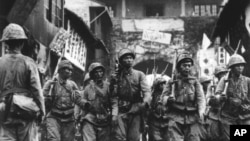Taiwan has declined China’s pitch for joint participation in activities to mark the 70th anniversary of World War II’s final year. Japan was forced to withdraw from both territories in 1945. But today China and Taiwan are separately ruled, and many Taiwanese now see modern Japan as a model, while distrusting Beijing. Taiwan has politely rebuffed Beijing’s suggestion for joining in activities to mark the end of World War II, 70 years ago this year. Chinese leaders said earlier in the week they will hold a military parade and a reception to mark the occasion, possibly inviting leaders from other countries affected by the war. On Wednesday, China’s Taiwan policymaking body said it welcomed Taiwan’s participation to share memories and band together.
But rules in Taiwan bar public servants from attending state events in China, which claims sovereignty over the self-ruled island and hopes to unify with it eventually despite opposition among Taiwanese people. Wu Mei-hung, deputy minister of the Taiwan government’s China policymaking body, the Mainland Affairs Council, said her government will follow the rules.
She said there are definite, relevant management guidelines as to what public servants can and cannot do. If public servants want to go on their own to an exchange activity, they would need to respect the related rules, Wu added, and the Mainland Affairs Council believes the rules don't allow currently employed public servants to attend activities organized by mainland China or reviews of their troops.
China hopes to bring Taiwan closer by finding common causes, including shared memories of the battle against Japan before 1945. Japan ruled Taiwan as a colony for five decades and met resistance in the early years. Japan also took over parts of China from 1931, slaughtering civilians in some regions, despite resistance from the then Nationalist Chinese government.
The Nationalists were at that time also fighting the Communists for control of China. When they lost, the Nationalists fled to Taiwan and started a rival government. Since then, China's Communist Party has sworn to bring Taiwan into its fold. Taiwan and Japan are now close informal allies, sharing cultural ties that stem from the later years of Tokyo's colonization. China and Japan have struggled to get along for the past 20 years.
Since President Ma Ying-jeou took office in Taiwan in 2008, his government has eased tensions with Beijing, leading to 21 economic agreements. But Ma's government faced mass protests and local election losses last year in part for expanding relations with Beijing. His Nationalist Party hopes to garner more popular support ahead of the 2016 presidential race, making any formal appearance in China a risky move.
Wu said ordinary Taiwanese may go to Beijing's war memorial events but advises caution.
She said that if retired staff members and common people go, the government urges them to consider all points of view among Taiwanese people and, on a principle of mutual dignity, protect exchanges with mainland China and the country's safety.
Taiwan's cabinet will direct the defense ministry to hold the island's own series of events to remember the end of World War II.




